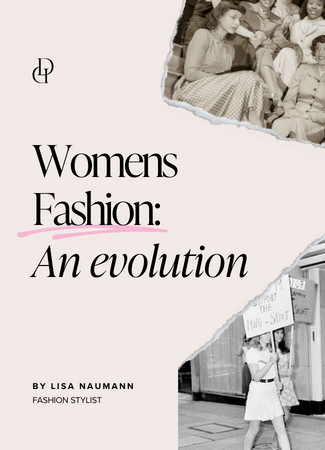dignity diaries
featured articles listed
Women’s fashion: An evolution
Dress for Dignity
|13/03/2023

By Lisa Naumann, fashion stylist.
@styledbylisaj / www.styledbylisaj.com.au
As we celebrate Women’s History Month, I want to reflect on the evolution of women’s fashion over the last century and how changes in social norms have impacted the landscape. Throughout modern history, we have observed fashion trends being influenced by female empowerment. Women are demanding clothing that reflects their diverse identities, and designers are responding by creating more representative collections that celebrate women and challenge traditional gender roles.
In the early 20th century, women's fashion was characterised by conservative, form-fitting designs that emphasised modesty and femininity. Women were expected to dress in a way that was appropriate for their gender and social status. Hemlines were kept below the knee and only a high, decolletage-covering neckline was considered proper. The impact of the feminist movement was not yet felt, and women's clothing was designed to emphasise their domestic roles as wives and mothers. As the 20th century progressed, societal norms began to shift and women began to expect more freedom and autonomy. This led to a revolution in fashion. Hemlines rose, fabrics became lighter, and women's clothing turned more practical and functional.
Our fashion has adapted over the last century to reflect changed societal attitudes: from the acceptance of women wearing pants in public in the 1920’s; to the mini skirt becoming a beacon of women’s liberation in the 1960’s; to 1980’s power dressing signalling women’s advancements in the workplace. Post-Y2K, we witnessed many different fashion styles emerging. Like them or loathe them, (hipster jeans, I’m looking at you) we have been presented with more options than ever before. Societal attitudes towards fashion for women have evolved from conformity to freedom of choice. The next step in this evolution is to ensure equity of access for all women, and those who identify as women, to ensure total inclusion.
Once again, the fashion industry sits on the cusp of a major societal shift. Inclusivity and diversity have become significant priorities amongst consumers and advocates. In recent times, designers and marketing platforms have responded to calls for greater diversity by showing collections that are more representative of the identities and lifestyles of modern women. This includes celebrating different body types and shapes and understanding that beauty comes in all sizes. Further work still needs to be done to increase the size range for sample sizing and integrating “curve-sizes” within a collection, rather than an add-on at the back of a shop or a special section on a website.
The industry is also beginning to recognise the significance of featuring models with physical disabilities in campaigns and runway shows. This sort of inclusion needs to be systemic from now on and adopted as mainstream rather than tokenistic. The same can be said for showing a diverse range of age groups, ethnicity groups and members of the LGBTIQA+ community in campaign materials.
We have come so far and yet I feel we are just at the beginning of true acceptance of wider society in the fashion industry. To continue this trajectory, a commitment to ongoing learning, collaboration and integration is required from all stakeholders, including designers, retailers, consumers, and industry organisations to ensure inclusivity is considered a simple baseline requirement. When more people feel seen and represented, acceptance and tolerance grow. We start to break down harmful stereotypes and biases.
Women have overcome so many challenges in the last century. This Women’s History Month, let’s celebrate the progress we have made and now acknowledge the need for a sustained commitment to inclusivity and diversity to further the great advancements in fashion for women and those who identify as women.










